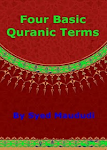Gems of the Quran
by Amatullah
Bismillah
Alhamdulillah, I’ve been blessed to take the Arabic 201 class with Bayyinah Institute for the second time and mashaAllah br Nouman has this sunnah of taking 10 minutes at the end of each session to share a literary gem of the Qur’an.
InshaAllah I will be posting all nine that he will share with us; one for each day of the class session.
Here is tonight’s gem:
In Surat Saba, ayah two, Allah azza wa jal says:
يَعْلَمُ مَا يَلِجُ فِي الْأَرْضِ وَمَا يَخْرُجُ مِنْهَا وَمَا يَنْزِلُ مِنَ السَّمَاءِ وَمَا يَعْرُجُ فِيهَا ۚ وَهُوَ الرَّحِيمُ الْغَفُورُ
He knows that which goes into the earth and that which comes forth from it, and that which descend from the heaven and that which ascends to it. And He is Ar Raheem, Al Ghafoor.
In the Qur’an, Allah ta’ala mentions more than 70 times that He is Al Ghafoorur Raheem. This ayah above is the only instance in the whole Qur’an that the order is reversed: Ar Raheemul Ghafoor.
Why?
Imam ibnul Qayyim states that if you study ‘ilm (knowledge) in the Qur’an, you’ll find that Allah ta’ala mentions rahmah (mercy) with it. Here are some examples:
رَبَّنَا وَسِعْتَ كُلَّ شَيْءٍ رَّحْمَةً وَعِلْمًا
“Our Lord! You comprehend all things in mercy and knowledge“ (40:7)
The duaa of those well-grounded in knowledge (ar-raasikhoon) is:
رَبَّنَا لَا تُزِغْ قُلُوبَنَا بَعْدَ إِذْ هَدَيْتَنَا وَهَبْ لَنَا مِنْ لَدُنْكَ رَحْمَةً
(They say): “Our Lord! Let not our hearts deviate (from the truth) after You have guided us, and grant us mercy from You. Truly, You are the Bestower.”
Allah ta’ala begins this ayah from surah Saba with يَعْلَمُ, He knows, which as we’ll see below, has a direct connection with why Raheem is mentioned first.
When we examine Ghafoor in the Qur’an, or maghfirah (forgiveness), we notice that it is paired with humans. Here is an example:
Nuh alayhi salaam to his disbelieving nation said:
فَقُلْتُ اسْتَغْفِرُوا رَبَّكُمْ إِنَّهُ كَانَ غَفَّارًا
“I said (to them): Ask forgiveness from your Lord; Verily, He is Oft-Forgiving” (71:10)
In this ayah from surah Saba, do we see a direct address to humans? There is mention of the earth, what comes from the sky, what ascends…Humans are mentioned indirectly, and by examining this indirect address, we can see why Raheem is mentioned before Ghafoor.
How so?
يَعْلَمُ مَا يَلِجُ فِي الْأَرْضِ He knows that which goes into the earth: We place seeds into the earth, but furthermore, we will also go into the earth one day. We will need the rahmah (Mercy) of Ar Raheem when we go into the earth.
وَمَا يَخْرُجُ مِنْهَا And that which comes from it: The plant grows from the earth, but furthermore, we will one day be resurrected from the earth. We ask for and need the maghfirah (forgiveness) of Al Ghafoor when we come out of the earth.
وَمَا يَنْزِلُ مِنَ السَّمَاءِ and that which descends from the heavens: Rain is a rahmah (mercy) upon us, wahy (revelation) comes from the sky and is also a rahmah upon us, our rizq (provision) comes from the sky which is also a rahmah upon us.
وَمَا يَعْرُجُ فِيهَا and that which ascends to it (the sky): What ascends to the sky? Our duaa, our souls, and deeds. What do we need in all three of these instances from Allah ta’ala? Maghfirah (forgiveness), for our duaas and deeds to be accepted, and our souls to be forgiven.
Then Allah ta’ala ends the ayah with the subject on this gem: وَهُوَ الرَّحِيمُ الْغَفُورُ And He is the The Especially Merciful, the Most Forgiving.
Each part of this ayah connects with these two Names of Allah, in the order that they appear.
SubhanAllah.
The most common “criticsm” of the Qur’an is that the verses repeat too much and the ayaat are all the same in a lot of surahs. But when we pay attention to the Qur’an, when we truly ponder, then we see that there is actually little repitition. These are not ordinary words, they are Divine Words that have a profound wisdom.
In speech, there are two parts:
1- Content: what you say. The Qur’an has Divine content.
2-Style: how you say it. The Qur’an presents this content in a profound and miraculous style.
Humans are not capable of having both content and style constantly. Take for example the famous quotes we all know, “I have a dream” or “there is nothing to fear but fear itself”. These quotes came from speeches, but the only part we know or remember are those few words.
This Qur’an, these blessed words of Allah azza wa jal, constantly keeps both content and style and by pondering over these verses in a humble manner, we can taste a few drops of these wisdoms.
May Allah azza wa jal make us companions of this book, Ameen.
from → Arabic, Awesomeness, Bayyinah Gems, Gems, Good Things, Qur'an, SubhanAllah
Taken from: http://tayyibaat.wordpress.com/
Here are some More Quranic Gems for You to benefit from:
Session One: Mercy and Forgiveness
Session Three: Oaths in the Qur’an
Session Four: Syntax in the Qur’an
Session Five: The Precise Selection
Session Six: The Miraculous Ayah
Session Seven: Bonds of Brotherhood
Session Seven pt 2: The Most Noble of Tasks
Session Eight: Dialogue in the Qur’an
Session Eight pt 2: Weakening and Empowering a Statement





































0 comments:
Post a Comment